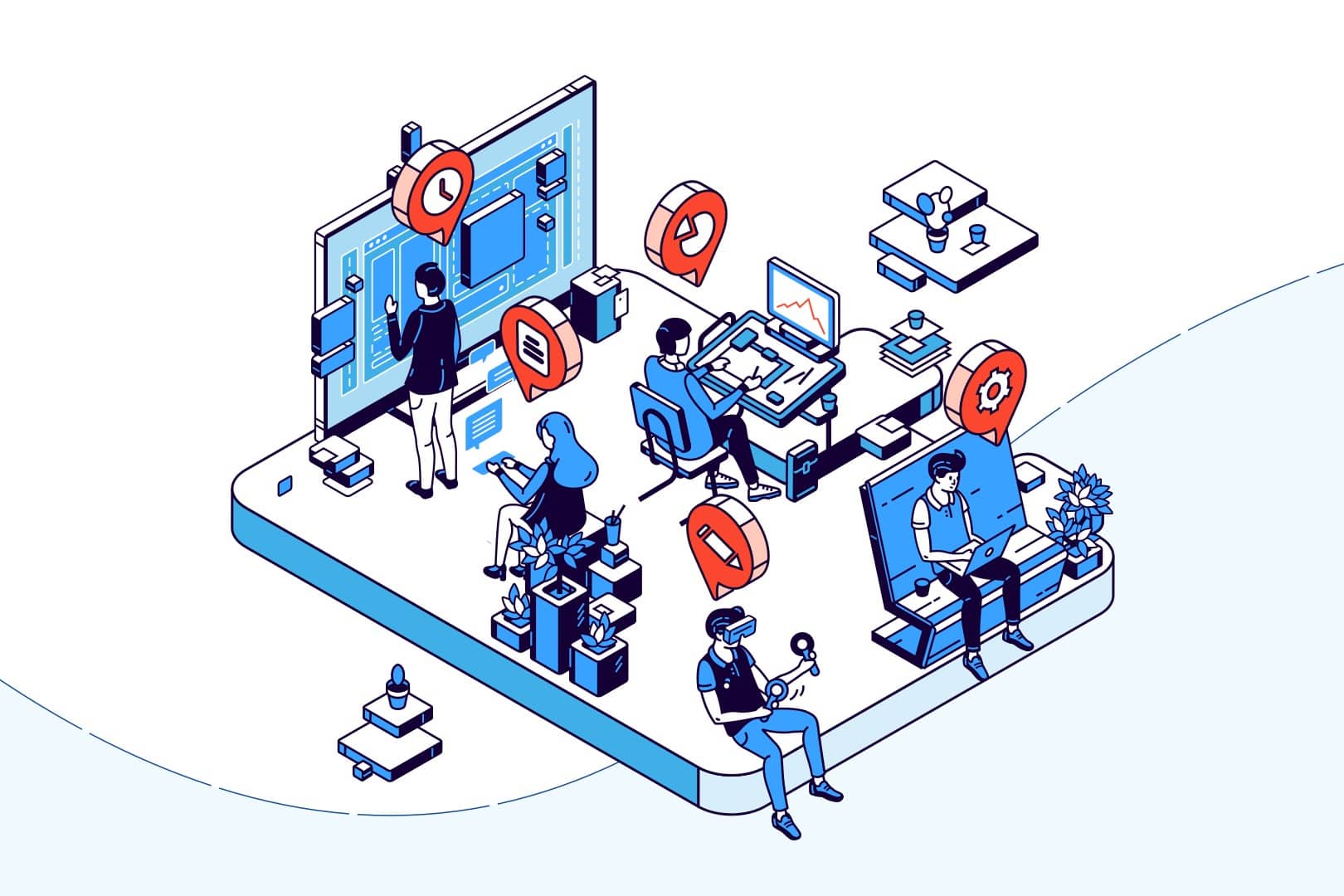Do you know what are the crucial roles in all development teams should have. Let’s find out who they are.
Development may appear to be akin to black magic. A slew of weird words and phrases that you’re not always sure how to pronounce. It’s easy to become confused in the thick of software development project team duties and responsibilities, especially if you’re a non-technical product owner embarking on your first IT project. We’ll start with the basics in this post and address the question, “Who performs what in your software teams?”
Before you go, you’ll need to organize your development teams by including all the Crucial Roles in all Development Teams in order to be succeed.

It’s a very usual scenario: you (the client) select a development firm and attend the initial software consultations with your business idea in mind, hoping to employ a one-stop shop. After all, it’s “one project for one crew.” Following that, you learn that the team should consist of at least four to six persons, based on an initial project review. “What does a software development team do anyhow that I require so many people?” you might wonder. “, “How come I can’t just hire one person to complete the project?” “,”Is this how you build your software development team on a regular basis?” “, “What’s the difference between all of these groups?” “, “Am I being taken advantage of?” ”.
The fact that the world of development is wide means that a single individual is frequently insufficient to form a development Agile team structure. For varied reasons, dozens of different technologies, programming languages, and tools are now used. From ensuring that your browser displays the correct colors to managing how you save data and perform computations, to ensuring that your product is secure and trustworthy, we’ve got you covered. Without a good software engineering organizational structure, even Steve Jobs wouldn’t be able to do it all by himself!
This is why software businesses form interdisciplinary software development teams with a variety of expertise and sub-teams to ensure that all bases are covered. The most frequent development team members in an Agile software development team are described below. You’ll know what to expect from your first software consultations after reading this article, and you’ll be well-prepared to get started on your project.
If you’ve never worked with a development team before, you might assume that they’re just a bunch of software engineers led by some sort of leader who work on digital projects. While there is some truth in that, the reality is far more complicated. Sure, developers are the backbone of a development team, and someone is in command of the entire project, but there are other important roles to be aware of.
Why? Because knowing what responsibilities are required for a successful development team puts you one step closer to building one. We know how important it is for people to grasp these responsibilities in order to better comprehend the dynamics of the development team and what each of its members brings to the table, based on our experience as offshore developers. But first, let’s look at some team-building basics.
What Makes a Great Software Development Team?

A good software development team is one that has all of the functions that are required for the project. Because each project has its own set of requirements, putting together a good team entails bringing together the necessary individuals to tackle the project plan while maintaining a goal-oriented approach that emphasizes creativity, problem-solving, innovation, and communication.

When you go through the hiring process for each position, you should aim to get all of those values. However, you should keep them in mind because you can’t expect all candidates to share them – you’ll have to actively seek out candidates that share some of those values when hiring for your development team. You should also use them as the foundation of your development process, informing your workflow to better the end results.
It’s also important to remember that diversity is vital for excellent software development. This is because people from all backgrounds and walks of life can offer new insights to your initiatives, enriching them and having a beneficial impact on them. You shouldn’t be concerned about gender, ethnicity, age, or geographic region because talent transcends all of these factors.
Let’s find out the what are Crucial Roles in all Development Teams.

- Product Owner
The product owner is the person that knows how the final product should look because they deeply know the project and users as one of the Crucial Roles in all Development Teams. Additionally, it’s the one that better understands the client’s requirements, so they are in the best position to lead the development towards a satisfactory final product.
The final objective of a product owner is to ensure that the product that comes out of development provides the value you’re looking for. That’s why the product owner must be analytical and creative and aware of the current trends to inform the development process.
- Engineering Manager
The engineering manager as one of the Crucial Roles in all Development Teams who is in charge of ensuring that the entire lifecycle runs smoothly. As a result, they are in responsibility of planning the project, defining its scope, putting the plan into action, tracking its progress, and recognizing the completion of the project. Essentially, the engineering manager oversees and monitors the software developers’ daily work.
Despite the fact that engineering managers do not code, they do have a foundation in software development (they often are software developers with extensive field experience). This equips them with the knowledge to recommend paths to go when problems arise, which is common in today’s flexible development environment.
- Software Architect
The software architect as one of the Crucial Roles in all Development Teams who is responsible for defining the software’s internal structure as well as its technical elements. They also design the tech stack and code review to assure overall quality, all while keeping one goal in mind: to keep the code simple and functional.
In addition, the software architect provides technical support throughout the software development lifecycle, from conception to release. As a result, they must have extensive technical knowledge as well as leadership abilities in order to assist and drive software engineers throughout the process.
- Software Developers
Product developers are the foundation of any development project, and they are in charge of actually creating the software as one of the Crucial Roles in all Development Teams. They are primarily responsible for developing the software, which entails addressing the logical issues that arise during the project and developing solutions for them to be implemented through efficient code.
You might believe that to establish your team, you need to hire the most experienced developers feasible. While experience is necessary for developing advanced solutions, you can always supplement it with junior developers who can handle mundane chores. As a result, you can have a more diverse team that plays to each member’s strengths and delivers the solutions that different tasks require.
- UX and UI Designers
Okay, they are two distinct roles, but their responsibilities are interwoven, so we’ll treat them as one. On the one side, the user interface designer is in charge of creating the user interface, which is everything that users view and interact with when using the product. The UX designer, on the other hand, is in charge of providing a positive user experience by paying attention to everything from the interface to the performance.
UX designers, in a sense, supervise UI designers, as their work has a significant impact on the overall experience. The UX designers, on the other hand, go above and beyond, thinking like end users and suggesting enhancements to make the software more usable and enjoyable. It’s about defining how the software works, how it can convey what it expects from the user, and how it can be easier to grasp at a glance, all while delivering excellent performance. So, both UX and UI Designers plays the Crucial Roles in all Development Teams.
- QA Engineer
Though some may not consider the QA engineer to be critical to a team’s success as one of the Crucial Roles in all Development Teams, this position has grown critical. This is because they examine the software development processes to guarantee that they are efficient enough to produce high-quality solutions. As a result, their duty include more than just pointing out errors; it also entails comprehending the underlying development procedures and offering improvements that would improve the final products’ quality.
With each passing year, QA testers become increasingly important as the need for higher-quality goods grows. The goal is to create more robust software that can withstand growing digital attacks while also reducing product vulnerabilities to a minimum.
- Business Analyst
Finally, we have the business analyst as one of the Crucial Roles in all Development Teams, who is responsible for understanding the client’s business requirements in order to guide their development. Those requirements are transformed into requirements, which are then translated into the software’s objectives. This is a difficult procedure, but it is critical to the success of any endeavor.
Early in the development process, business analysts bring a lot of imagination to the table. They provide methods for transforming business requirements (typically abstract or unrelated to software) into requirements that developers can work with. Business analysts back up all of their proposals with solid facts, so that creativity isn’t just a figment of their mind.
The Perfect Team : With Crucial Roles in all Development Team

Now you know what the roles and key players which plays the Crucial Roles in all Development Teams in order to deliver the successful project. While all of these jobs are necessary at some stage during software development, you may have some projects that can do without one or two of them. You should have all of them on board if possible, because they each add unique value and capabilities to the development process. However, as previously stated, it all depends on the type of construction you’re constructing, your individual circumstances, and existing infrastructure.
As you can see, forming a competent development team isn’t straightforward, as it necessitates paying attention to a variety of factors. If you’re having trouble with this or need to swiftly assemble a development team with all the Crucial Roles in all Development Teams, consider seeking assistance from a seasoned source like BairesDev. Years of IT development have equipped us with the expertise and methods necessary to assemble the greatest IT workers for any project, no matter how big or small.
Also, as you can see, there are significantly more responsibilities in a development team than “simply developers.” Writing the code is actually the simplest part, and it isn’t even the most time-consuming activity for a developer. The business idea itself, the user experience and look and feel of your application, the app’s stability and reliability, the performance and security of your system, the architecture of the solution, efficient algorithms, proper risk management, and the list goes on.
The nicest thing is that the size of the team doesn’t really matter. You don’t need to recruit all of those experts full-time. One of the most appealing aspects of working with a software development firm is the freedom it provides: we can work on your project with whoever you want, whenever you want.
As the knowledge seeker, you got that what are key roles and who are the Crucial Roles in all Development Teams in order to achieve common business objectives quickly and effectively in the turbulent , risky and completive business environment.


